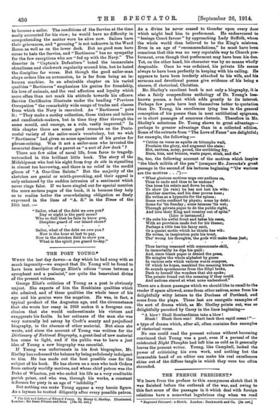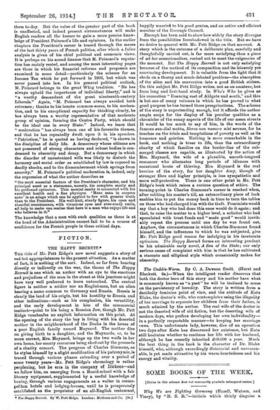THE FRENCH PRESIDENT.*
WE learn from the preface to this anonymous sketch that it was finished before the outbreak of the war, and owing to this fact some of the passages in it which deal with foreign relations have a somewhat lugubrious ring when we read • Raymond Poincati : a Sketch. London: Duckworth and Co. [5s. net.]
them to-day. But the value of the greater part of the book is unaffected, and indeed present circumstances will make English readers all the keener to gain a more precise know- ledge of President Poincare's life and opinions, In the earlier chapters the President's career is traced through the mazes of the last thirty years of French politics, after which a fuller analysis is given of his chief political and economic views. It is perhaps on his sound finance that M. Poincare's reputa- tion has mainly rested, and among the most interesting pages are those in which his financial reforms and proposals are examined in some detail—particularly the scheme for an Income Tax which he put forward in 1906, but which was never passed into law. In his general political outlook, M. Poincare belongs to the great Whig tradition. "He has always upheld the importance of individual liberty," and is " a worthy descendant of the great nineteenth-century Liberals." Again, "M. Poincare has always avoided both extremes; thanks to his innate common-sense, to his modera- tion, and to his exceptional capacity for thinking clearly, he has always been a worthy representative of that moderate group of opinion, forming the Centre Party, which should be the ideal one in every State." Indeed, we learn that " moderation " has always been one of his favourite themes, and that he has repeatedly dwelt upon it in his speeches.
"Patriotism," he is quoted as having declared, "is shown in the discipline of daily life. A democracy whose citizens are not possessed of strong characters and robust bodies is con- demned to obscurity and decay. But a democracy in which the disorder of unrestrained wills was likely to disturb the harmony and social order as established by law is exposed to deadly shocks, and to the dismemberment which springs from anarchy." M. Poincare's political moderation is, indeed, only the expression of what the author describes as
the most essential feature of the President's character, and his principal asset as a statesman, namely, his complete sanity and his profound optimism. This mental sanity is connected with his excellent health and a fine physique. • Arens sana in corpore sano' is an adage which can be applied to few with greater truth than to the President. His well-knit, sturdy figure, his open and cheerful countenance, with vivacious eyes and ever-ready smile, all help to make one realise that here is a man who enjoys life and who believes in it
The knowledge that a man with such qualities as these is at the head of the Administration cannot fail to be a source of confidence for the French people in these critical days.



































 Previous page
Previous page